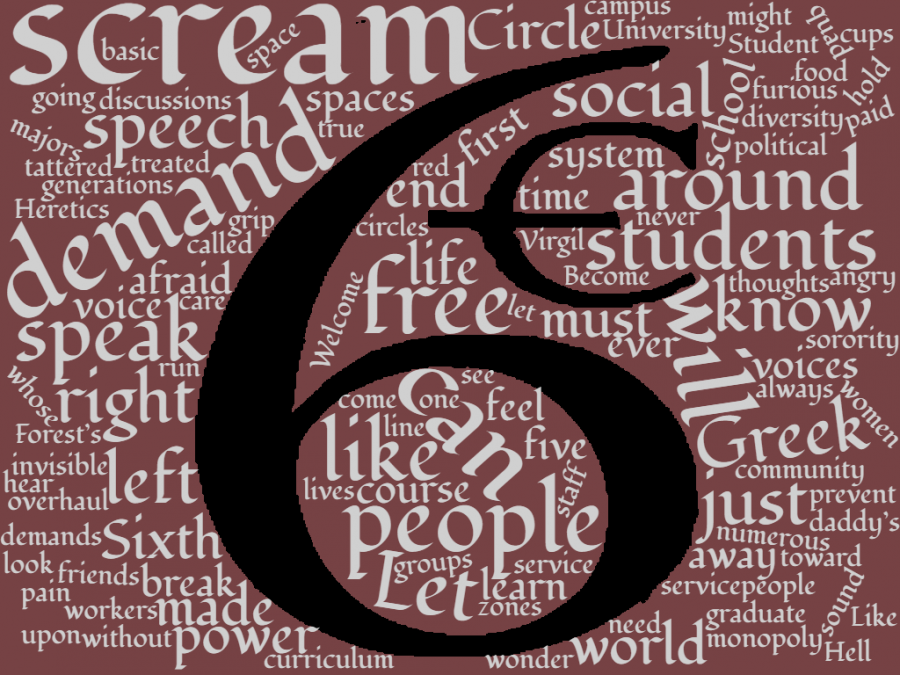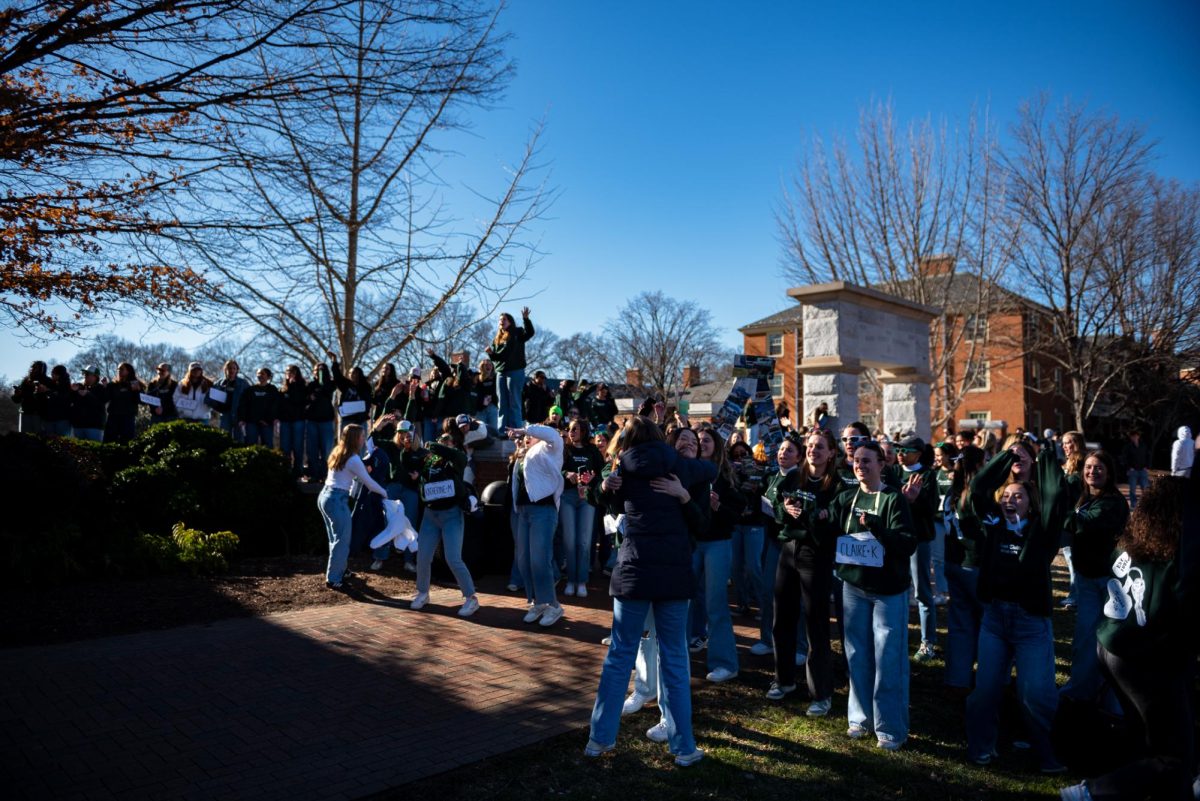An anonymous email sent to 194 students from three email accounts on Sunday evening titled “you are not safe here” issued certain demands to students and administration regarding campus life. A blog post with the same message was also made public a few weeks earlier on March 31. The email and blog post circulated among students on the evening of Sunday, April 8 and quotes Dante’s Inferno and references inviting fellow ‘heretics’ to join them in Hell.
The email makes five specific demands. The first calls for “a true democratization of politics,” meaning rethinking the way politics are discussed on campus beyond an ideological divide. The second demand is that ideas, “not just our speech,” becomes free, and references the Code of Conduct policies at Wake Forest to encourage more integrity in thought. The Sixth Circle also calls for better treatment of campus employees, a complete end to Greek life and an overhaul of the curriculum to inspire more cross-cultural understanding.
It was allegedly written by five students who claim to have been ousted by the Wake Forest community, disguised under the names: “Dante, Virgil, Beatrice, Lucifer and Farinata. Heretics of the Sixth Circle.”
“We have been phased out of your clubs, kicked out of your parties, left out of your meetings, and passed over in your rushes,” wrote the post. “We are five students who are too afraid to speak to you as friends, too angry to speak to you calmly, too tired to speak to you loudly. We have chosen instead to scream.”
After receiving the email on Sunday, many students reported it and the blog post to Campus Police, referencing their concerns for safety on campus. They were not met with immediate action.
However, on Tuesday, April 11, Student Government met with Dean of Students, Adam Goldstein and Wake Forest Emergency Manager, August Vernon. Officials shared that the situation was being addressed by the Crisis Management Team, the Student Incident Team and the CARE team. Student Government and concerned students learned that Wake Forest collaborated with local and federal law enforement, who eventually reached the conclusion that the Sixth Circle’s message did not indicate a direct threat.
“I was confused when I initially got the email,” said one student who called the police at the request of members of their Greek organization. They asked to remain anonymous for safety concerns. “When I called University Police they didn’t really say much, instead they seemed like they had heard multiple people call already so they just wanted to hang up and move on.”
Other students involved in Greek life have voiced opinions regarding the statements against the Greek community, including about the call to end it completely because of its nature of exclusivity. The post also named specific Greek organizations in its criticisms.
“I appreciate that there are members of the Wake Forest community who are willing to share their concerns about the fraternity and sorority community, and I welcome the opportunity to partner with those community members to address those concerns,” said Jack Walsh, the president of the Interfraternity Council. “The fraternity community, like every community, has its strengths and its challenges.”
As students voiced their concerns regarding the email, the Office of Communications and External Relations sent an email to the entire student body on Monday, April 9 reiterating their position that they have found there is no direct threat to students in the message. They also invited students to talk with “caring staff” on Monday in Benson. This guided conversation ranged from students citing reasons for feeling unsafe on campus, to others sharing that they regularly feel unsafe because of their identities.
Other students felt less threatened by the message, citing that its theatrics were more intimidating than the message itself.
“While it was clearly an unconventional and provocative way to present grievances to the Wake Forest community, there were no explicit threats made to any individual nor the school in the post,” junior Charlie Engel said. “Wake needs to continue to take measures to protect freedom of expression, and this is an instance deserving of such.”
By Monday, conversations around campus ranged from fearful to comedic or satiric. For example, Fake Worest, the online satire newspaper, posted on Instagram about the sixth demand of the Sixth Circle being peanut butter in the Pit. Campus Grounds also named a coffee drink after the Sixth Circle called “Dante’s Mocha.”
“I do not feel threatened by the Sixth Circle; some of their concerns were actually valid,” freshman Lane Morris said. “Mostly, I am grateful that they inspired my new favorite drink at Campus Grounds: Dante’s Mocha. It’s delicious.”
Outgoing Student Government President Spencer Schiller voiced his opinion on the matter. Schiller noted that while dialogue is important, inciting fear is not the appropriate manner to begin conversation.
“Questioning institutional structures is important in driving the progressive nature of higher education, but only when done in a civil and academic nature,” Schiller said. “I believe that this language (‘you are not safe here,’ ‘your days are numbered’ and ‘welcome to hell’) has taken away from what seem to be legitimate concerns about the wellbeing of the Wake Forest community.”
Schiller also corrected specific points of the article, noting that some of their points are misinformed. He pointed out that a holistic curriculum review is already underway encouraging a greater emphasis on liberal arts. Further, that a Code of Conduct review will be published on April 17 and actively sought the advice of students. Finally, he added that Aramark is implementing a minimum wage of $11.10/hour to all Wake Forest employees.
While the campus was chattering with talk about the Sixth Circle on Monday, a range of emotions were heard as the message was ultimately a criticism of the student body. Students voiced fear, humor and even criticisms of how they delivered their message, noting that some of the underlying points were valid.
“The email initiated conversation purely based on the fact that it was provocative,” senior Chris Pearcey said. “Instead of taking an opportunity to foster a constructive dialogue, the authors were focused on having an overaggressive, uncompromising verbiage which ultimately weakened the piece’s potential effect.”
The Sixth Circle could not be reached for comment.















